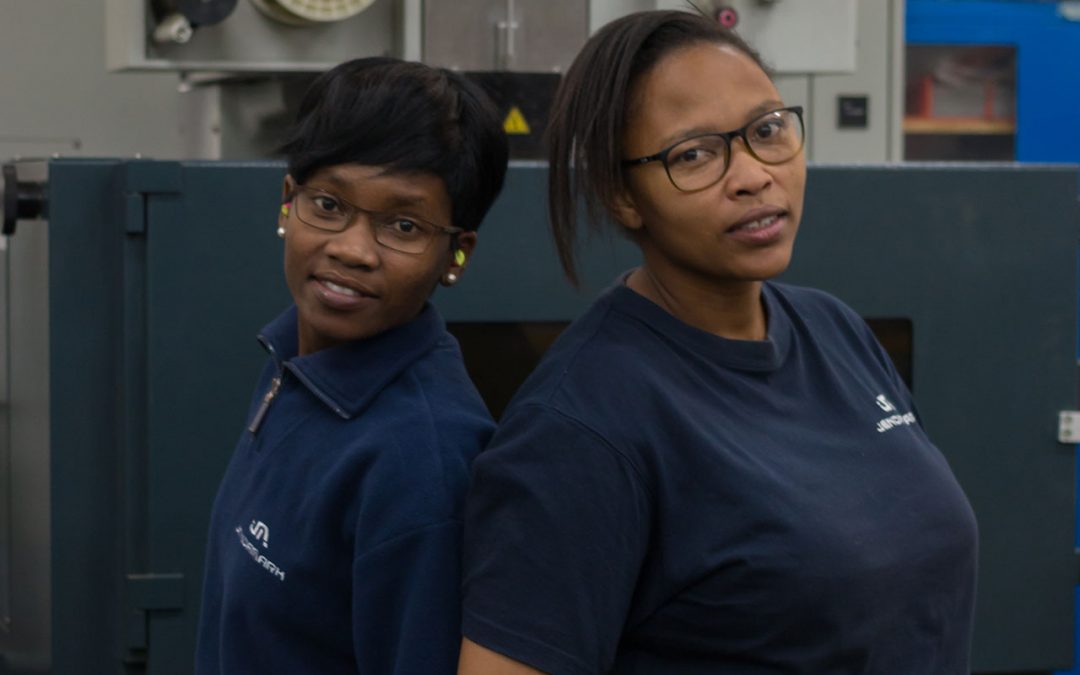Jendamark’s rigorous apprenticeship programme contributes to job creation, while building a highly skilled workforce trained to do things “the Jendamark way”. Here two female artisans share their success story.
“The very first thing you have to do is plan your job. You can’t just put it on the machine because you don’t know what complications you’re going to meet and you may have to modify it.”
This is the advice of 29-year-old Funeka Solomon, one of the 20 candidates handpicked for Jendamark’s in-house apprenticeship programme since 2012.
Now a qualified grinding artisan, Solomon successfully completed the company’s rigorous four-year programme in two-and-a-half years after being subjected to several insubstantial learnerships.
Armed with an NQF level four qualification but unable to find the challenge she craved, Solomon finally found what she was looking for when she was recruited by Jendamark.
The demanding in-house programme covers the theoretical and practical modules required by the national sector education and training authority for the mechanical, engineering and related trades (Merseta).
On completion, candidates are ready to sit their national trade test to become qualified artisans – in mechanical engineering for toolmakers and electrical engineering for electricians.
THE DAILY GRIND
Today, Solomon’s single-minded focus, competency and passion for the job are a far cry from her first encounter with the toolmaking trade.
“To be honest, at first I thought I was going to make tools like hammers or pliers. Then, when I learned what it was all about, I loved the challenge.”
Assuming the mantle of mentor, she now shares the technical and practical guidance she received with the apprentices following in her wake.
“The Jendamark artisans who trained me gave me a lot of responsibility and opportunities to learn early on. I can now guide others and be the artisan that someone was for me.”
She says Jendamark’s on-the-job training taught her to raise the bar in terms of performance and precision.
“It’s all about problem solving. If something doesn’t fit, you must find out why and fix it. The things we do here are at a higher level than other companies. I want to be precise, even if it’s only a micron or two, according to the drawing.”
Solomon says the secret to success is simply to love the job.
“You’re always thinking about the job, even when you’re at home. You’re constantly trying to figure out how you’re going to do this or that, because you don’t want to make scrap.”
THE RIGHT FIT
Like Solomon, CNC machine operator Nolovuyo Mjuza completed the programme in just two-and-a-half years because of previous exposure to similar, albeit poorly run, learnership programmes.
“We used to sit at home for up to three months and were taken to companies where they made us paint walls and do odd jobs. When we got to Jendamark, it was different.”
Here she learned to machine to extremely tight tolerances, moving between the milling machine, grinder and lathe, says Mjuza, 30.
“As apprentices, we were shown the entire process – from interpreting a drawing through to manufacturing and assembly. In this way, I could see how my job fits into the bigger picture.”
Although she initially studied mechanical engineering, Mjuza left college to take up her first learnership opportunity, as toolmaking sounded like exactly the kind of mental and physical challenge she was seeking.
“Engineering has always been my thing. I actually wanted to be a fitter but there were only toolmaking opportunities available at Jendamark at that time.”
Today, Jendamark has expanded its programme to include toolmakers, electricians, fitters and millwrights.
WOMEN’S WORK
As women in a male-dominated industry, Solomon and Mjuza are holding their own in the toolroom. “The guys treat you like an equal; you’re ‘in’ if you can do the job,” smiles Solomon.
Although women’s empowerment plays an important role in the apprenticeship programme, skills development facilitator Marcha van Huyssteen says it’s more about moulding good candidates to become “Jendamark people”.
“These are people who are team players, who aren’t afraid to go the extra mile and do more than is expected of them.”
Van Huyssteen says the ideal candidates need to be technically minded and in possession of their N2 diploma.
“Many people have their qualifications but are struggling to secure the workplace experience they need. That’s why this type of programme is so valuable to them.”
